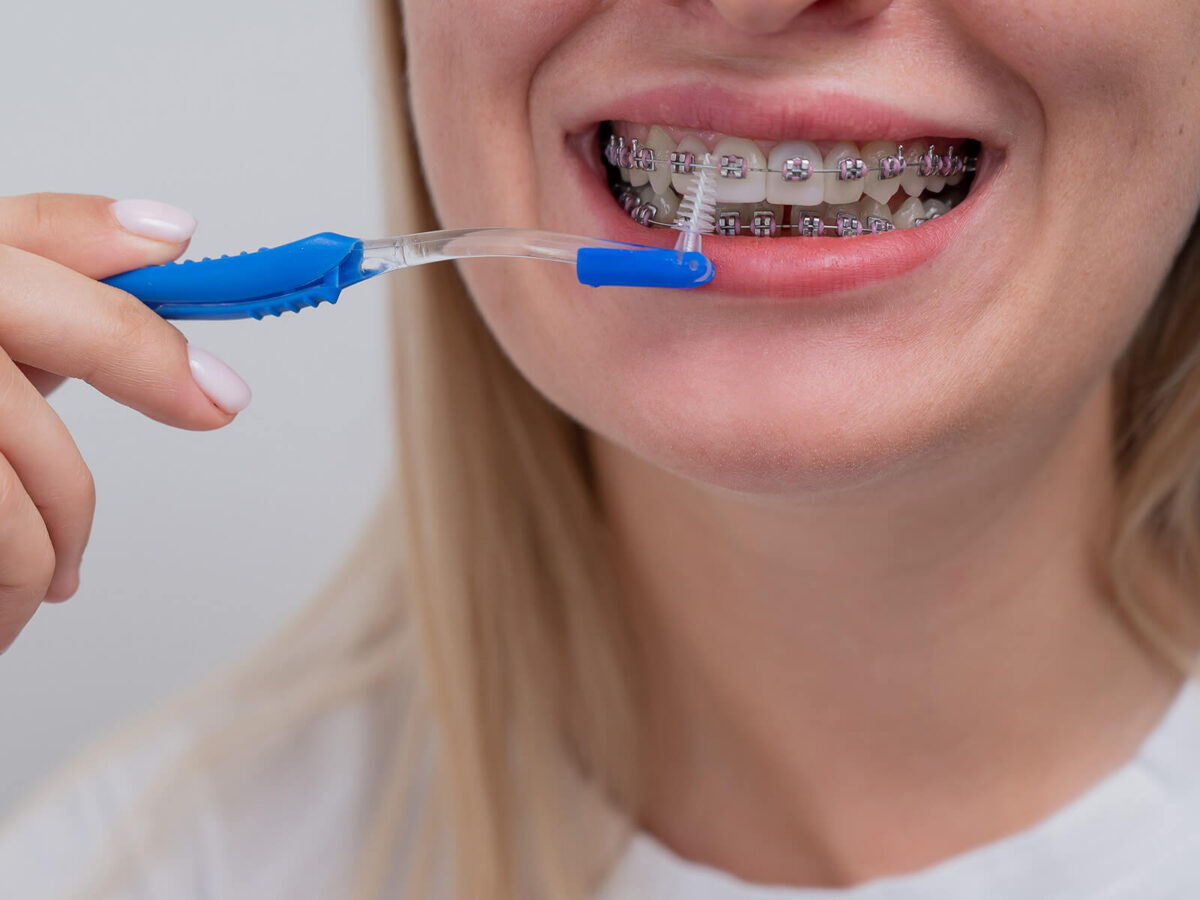Blog
Dental hygiene tips for healthy teeth & gums

Maintaining Good Oral Hygiene During Orthodontic Treatment
Regardless of whether or not a person is in orthodontic treatment, there is always the need to have good oral hygiene. Ensuring you take the required amount of oral care products and make it a routine from childhood to adulthood is vital for good teeth health.
However, the importance of oral hygiene becomes even more significant during the treatment with orthodontic appliances. Your teeth are systematically aligned to the right position, and you would not want to lose that great appearance you have invested in. When you have braces, the brackets and wires on your teeth also close down the spaces, making cleaning your teeth and gums slightly more challenging.
Why Good Oral Hygiene Is Vital During Orthodontics
If you don’t pay enough attention to oral hygiene, then you will face a higher chance of developing tooth decay and gum disease. In the worst case, you may be left with discoloured teeth, especially around the brackets that used to be firmly fixed on your teeth while undergoing treatment. The major culprit is dental plaque, which is a soft, furry material composed of microorganisms and saliva proteins.
Plaque facilitates the adherence of bacteria that are usually found in the oral cavity to the tooth surface. The bacteria form aggregates in the dental plaque as more plaque accumulates on the tooth surface, and they even produce a substance that shields those bacteria from the environment within your mouth.
Importance of Maintaining Good Oral Health During Orthodontic Treatment
Braces or any modern orthodontic appliance, including the Invisible Aligner, brings certain difficulties and complications to dental hygiene. Despite helping to align the teeth and give aesthetically appealing smiles, these orthodontic appliances can provide harborage for food debris and dental plaque.
If patients fail to clean their teeth and gums properly during treatment, it may result in some dental complications, compound the time taken to do the treatment, or even affect their dental health in general.
Daily Oral Care Routine
An effective daily oral care regimen is the foundation of oral health during orthodontic treatment. Being preventative is crucial for oral health when you have braces or aligners.
It is essential to keep the teeth clean, especially when orthodontic appliances are placed in the mouth. Whether you have regular metal braces or Invisalign, it is essential to actively approach dental cleanliness.
- Brushing After Meals: Using a toothbrush, clean your teeth after every meal to avoid the buildup of foods that may get stuck on braces or aligners.
- Orthodontic-Specific Brushes: Brushes are recommended for orthodontic patients and will effectively clean around the wires and brackets.
- Flossing: Special importance should be given to the flossing process, which helps clean the places difficult to reach with a toothbrush. Floss threaders or orthodontic floss may be of help when it comes to this stage.
- Rinsing: Use an antimicrobial or a fluoride mouthwash.
Oral Hygiene Tools: It is recommended that orthodontic patients use interdental brushes, water flossers, or proxy brushes in addition to what they are already using. - Thoroughness and Time: Spend as much time caring for your mouth and cleaning all areas.
- Frequency: Try to brush at least after each meal and floss daily, but if that is not feasible, rinse your mouth out and clean your teeth as soon as possible.
Therefore, by following these practices each day, you will be able to count on a clean, healthy oral habitat while doing your orthodontic work.
Nutrition and Diet
A person’s food habits have a certain influence while an individual undergoes orthodontic treatment. But now it also seems suddenly clear that it is not only the success of orthodontic treatment and other works of a dentist but also the further state of your teeth that can change with a new flavor on the tip of your tongue after a meal.
Some foods are not friendly to the teeth, especially when they are prevented with braces or aligners. It can be easily trapped between brackets, wires, or aligners; this causes hygiene complications and may damage the appliances. Those are some foods one should know of and consider for orthodontic-friendly meals.
- Avoid Sugary and Acidic Drinks: Refrain from taking beverages with high sugar and /or acidic content, such as soda, fruit juices, and energy drinks, as they cause tooth decay and erode tooth enamel coat.
- Cut Down on Sticky or Hard Foods: Sweets, candies, gum, and anything of a sticky nature are off-limits, as this stuff can destroy orthodontics and your teeth. These forms of food should be shunned during treatment.
- Stay Hydrated: Patients should drink a lot of water to wash food debris and to stimulate the production of saliva for the protection of teeth.
Habits for Good Oral Hygiene
Standard hygiene practices are important when it comes to oral care, so it is advised that you incorporate good habits when under orthodontic treatment. These habit-forming strategies will assist in the development of the desired oral health care routine.
- Start Small: Start with some slight alterations regarding the oral hygiene practices that you perform daily. For instance, if you have never flossed before, leave yourself a goal of at least 1 minute of flossing at night. To guarantee you achieve the goal, use a timer.
- Be Consistent: It also means that consistency must be emphasized when developing a habit. Build a daily timetable in which you allocate a particular period that will be devoted to oral care only. Regularity reinforces habit formation. Flossing or using the interdental brushes is the most effective before bed. Ensure that you incorporate the extra time into your schedule.
- Use Visual Cues: It may be useful to get a small sticky note or reminder for the mirror when you may be in a rush to remind you to follow through with an oral care regimen.
- Layer Your Habits: It is recommended to carry out your oral care routine with another activity already a part of your everyday schedule. For instance, commit to brushing your teeth following the skincare regimen or after you bathe at night. This generates a positive relationship from one activity to the other, thus making it interrelated.
- Get Back on it: If you have had a terrible day in your efforts, do not use this to make the period with bad habits longer. Straighten up and return to your daily scheme of things at your first chance.
Reward Yourself: A simple incentive for an oral care routine after some days of practice can improve its experience and consistency. - Accountability and Support: This is something that you can share with friends, workmates, partners, or other family members. Having other people to report to is helpful, as this tends to inspire one to work harder.
Regular Dental Check-ups
Another essential concept defining the basic approach to preserving the health of teeth during orthodontic treatment is the role of dental check-ups. These appointments are crucial in monitoring the state of your orthodontic treatment and the general health of your teeth.
Check-ups for orthodontic treatment differ from traditional dental visits, but both are related and function in coordination to diagnose your mouth’s condition. Orthodontists will concentrate on the coordination of your teeth and the operation of your braces or aligners, while dentists will check your dental health, the shape of your teeth, the status of your gums, and other issues. If you go for check-ups, any concern or problem likely to occur during the orthodontic treatment process will be easily noted and dealt with.
Summing It Up
In summary, the health of your teeth and gums during orthodontic treatment depends on maintaining good oral hygiene. Our professionals at Mathis Dental Office TX advise routine brushing and flossing, avoiding specific foods and drinks, maintaining the cleanliness of your orthodontic appliances, and making frequent appointments for dental examinations. You may obtain the greatest outcomes by paying attention to these pointers.


